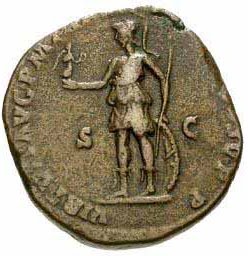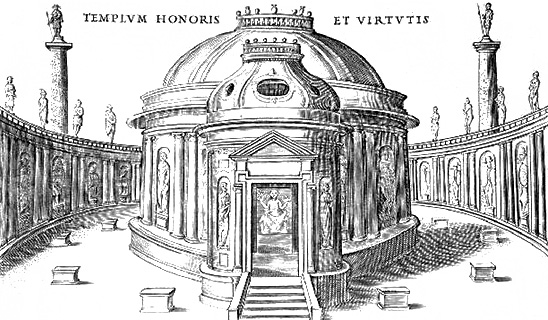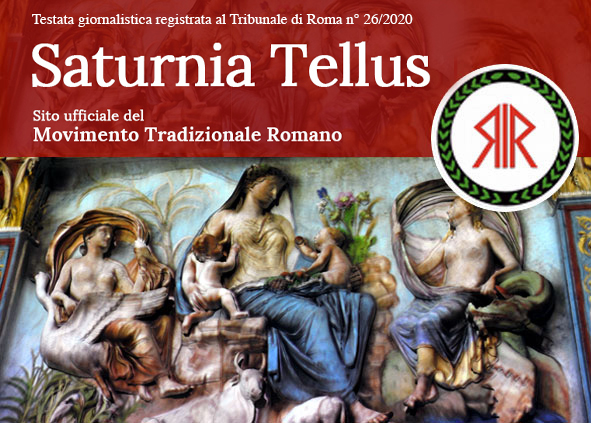Dedicated to my father, an example of Virtus.
 We live in an era where ethics has been disintegrated among a thousand labels and small groups, bought by a capitalism regulated only on paper and which reasons with the stomach, voraciously seeking the immediate benefit without looking in the face of anyone, while engulfing entire states. In universities, workshops, institutions, ethics has never been more out of fashion than today. In the shreds of our country, politicians follow every decimal of liking and, with turns similar to those drawn by the leaves brought by the autumn winds, change their opinions again and again according to convenience. Yesterday’s separatists are today’s nationalists, yesterday’s communists are the servants of today’s banks. MPs kiss rosaries and defend the Italian “presepe”, traditional Christian nativity scene, on the basis of empty images only to stir up a confused and impoverished people, perpetually angry and increasingly ignorant, with a total absence of ethical or historical reflections. Political majorities are extremely fluids as many politicians change plans and friends. Loyalty in politics is now synonymous with naivety.
We live in an era where ethics has been disintegrated among a thousand labels and small groups, bought by a capitalism regulated only on paper and which reasons with the stomach, voraciously seeking the immediate benefit without looking in the face of anyone, while engulfing entire states. In universities, workshops, institutions, ethics has never been more out of fashion than today. In the shreds of our country, politicians follow every decimal of liking and, with turns similar to those drawn by the leaves brought by the autumn winds, change their opinions again and again according to convenience. Yesterday’s separatists are today’s nationalists, yesterday’s communists are the servants of today’s banks. MPs kiss rosaries and defend the Italian “presepe”, traditional Christian nativity scene, on the basis of empty images only to stir up a confused and impoverished people, perpetually angry and increasingly ignorant, with a total absence of ethical or historical reflections. Political majorities are extremely fluids as many politicians change plans and friends. Loyalty in politics is now synonymous with naivety.
We are probably facing with one of those cyclical crises of civilization, when an epochal change overwhelms the old world like a tsunami, when the ancient values succumb to a globalism that relativizes and monetizes everything, cutting the rights conquered by the previous generations. It is a painful to see how today, at the edge of technological knowledge, we are alienated and humanly lost.
It happened in Athens, after the defeat of the Persians in Salamis, in 480 BCE. The Greek world found peace and the city-states expanded their sphere of action, their market, and their wealth as well, through trade. But it was precisely in this climate of wealth that the Greek citizens lost their contact with the polis, in favor of an extreme individualism, where fertile ground was provided to the utilitarian philosophy of the sophists. Socrates’ star managed to curb the moral drift for some time by introducing a concept of absolute good. However, social disintegration continued unchallenged after Alexander’s conquests.
The crisis of values also appeared in Rome, when the City became a world power, after the battle of Zama in 202 BCE. Before then, Rome was firmly rooted in its traditions. If in Greece the individualist tendencies had prevailed, causing the failure of the binomial nomos-polis, in Rome everyone, even the revolutionaries, still referred to the tradition of the Mos Maiorum (the Way if the Ancient), whose fulcrum was Virtus (Virtue), intended as an internal disposition of the Roman Vir (man) towards various aspects of daily life: Pietas (Piety) was the commitment of each person to the Gods, the family and every other human being, while social relations were governed by Iustitia (Justice), supported by Fides (Trust) as a mechanism of loyalty in interpersonal relationships, in addition to other virtues such as industriousness, skill, thrift, simplicity and also the ability to remain in place on the battlefield. Virtus was therefore the ideal that brought together all those qualities that the agricultural and warrior community expected to find in a Vir Bonus (Good Man). The community strengthened the social pact in times of crisis thanks to the mutual recognition of Virtus, which was therefore the social glue par excellence.
When Rome won Carthage, it was suddenly in charge of distant territories, with different cultures, where the social consensus needed to exercise the ancient Virtus was missing, so Roman administrators were exposed to the temptation to exploit the great power for their own personal benefit, on foreign people, without the constraint of the tradition of the far-away motherland. Even in Rome itself it was realized that the ancient morality of the peasant and warrior society of the previous century no longer lived up to the responsibilities of the present. Rome was on the abyss of individualism and selfishness just like Athens.
The awareness of this danger occurred thanks to the denunciation of a cynical philosopher, gifted with a very sharp mind. In 155 the Greek Carneades was hosted in Rome and attacked Roman politics with an irresistible speech before the ruling Roman class, including the illustrious Cato, demonstrating with his rhetoric that Rome’s foreign policy was not founded on Virtus but on injustice. The Romans, although scandalized by the accusations, simply did not have the means to counter the quirky Greek dialectic and even Cato was stunned, in silence, unable to defend Rome’s position. Rome’s impiety could not be true, but there was no vision of the Roman mission capable of reacting to criticism.
If the Carneades’ arguments had strongly demotivated the Roman ruling class, there was another philosopher destined to change the fate of the self-understanding of the new world power and therefore of its history in the centuries to come. The Stoic philosopher Panaetius of Rhodes, through the historian Polybius, came into contact with Publius Scipio, called the African, the architect of the victory over the Carthaginians, who became the new spiritual guide of the ruling class of Rome, with his retinue of intellectuals and eminent persons, gathered in the Circle of the Scipions. Stoa’s rationalism and many of its elementary concepts were adapted to the pragmatic and positive approach of the Roman citizens and Panaetius himself, impressed by the virtue of Scipio and the positive energies of the Latin people, contributed to change stoicism to the Roman mentality, neglecting the theoretical quibbles and emphasizing the approach to daily life.
For the Roman mentality it was very easy to accept the basics of stoicism, as to consider that the universe is providentially governed by logos, by reason, the same that reigns in each individual and that provides a purpose for history, and that the individual Gods are one manifestation of the Universal Divinity, and that Men and Gods are part of a natural community. Panaetius also introduced and amplified the importance of the concept of duty, alien to the Greek world. It is the duty of man to obey the rational law and follow its stated objective, the Virtus. In this way Virtus is endowed with a philosophical justification and a cosmic dimension.
Virtus, therefore anchored to the vision of logos, manifests itself in human activity within the state. Thus, the traditional aspiration of a Roman for primacy is fully justified as a manifestation of logos. However, it must purify itself and rise in megalopsychia, that is, in magnanimity, rising above external and material things, putting its aim not in satisfying personal ambitions to achieve command, but placing itself at the service of the community. In this way the Sons of Mars developed a concept of Virtus very different from the Greek Aretè, with a mission based on the duty intrinsic to the positions of command, a concept dear for many centuries to follow, for example to Octavianus Augustus as well as to Marcus Aurelius many centuries later.
The Roman “honestus” was opposed to the Greek “kalòs”. In fact, according to the ancient conception that Virtus had value because recognized by the community, Panaetius affirmed that the desire to be virtuous has roots in the human soul and that recognition by the people is the greatest reward and the presupposition of state activities. Honestus is the one who deserves honour with his moral characteristics and his work, “officium”, which is also a duty.
Panaetius then succeeded in providing Scipio, and the Roman ruling class for centuries to come, with the justification of Roman imperialism, which ensured the well-being of the defeated, stressing that well-being of the subjects must be the principle of domination. If Cato saw the ideal Roman as the peasant warrior tied to the earth, Panaetius sees in Scipio the embodiment of the spirit of Rome. Scipio, also according to the historian Polybius, was a man who had developed his natural propensity for morality by leading life in perfect coherence and full harmony with himself. Scipio was the embodied philosophy as an example to the Romans. 
In the Circle of the Scipions, the poet Lucilius expressed the scale of duties according to Panaetius’ philosophy in this way: “Virtue consists in putting the interests of the country first, the parents’ second and ours only the third”.
The stoic wind also came to the aid of the Roman religion, attacked by the Greek materialism which was attempting to spread to Rome. Panaetius defended traditional public Religio, affirming that it was the duty of the educated man to watch over the observance of the religious traditions of the Fathers. Although the cultured man could recognize a Transcendent Divinity, the traditional exercise of rituals towards the Gods and Goddesses of Rome was a necessary and essential exercise of Pietas.
In the field of law, the Romans learned directly from stoicism the means to raise jurisprudence from legal practice to science of law, as stated by Cicero himself in his work “Brutus”. The existence of a logos provided a tool to develop new forms of law: the ius civil was joined by the ius gentium, international law. There is a common basis between all peoples and all men, precisely thanks to the eternal law of logos, omnipresent. Thus, the natural law is developed, established for all men of the same rational nature and among all peoples. Thus, it becomes possible to speak of universal justice.
Many today mistake our following the Roman tradition as a romantic escape from reality, from everyday life or a fun role-playing game. None of this. We do not follow an idealized past made up of only good emperors and honest people: in antiquity, as today, everything has been seen. Ours, on the other hand, is a stubborn reaction to the blindness of the modern world, which entered into crisis exactly as it happened in Athens and Rome itself at different times, but this time without the support of a Virtus. We do not conform to a world where the powerful conquerors throttle the weak conquered in debt, both at the level of States, and of companies, and of jobs, and of people, fathers and mothers, and children exposed to an unethical system. Addressing globalization without the recognition of a common logos, of a reason, of a shared basis, means handing people over to the social and cultural massacre. We do not give in to the contemporary ethical void and continue to believe not only in the ideal, but in the daily practice of loyalty, duty, Pietas towards the society of men and Gods, through the exercise of our millennial tradition, of our calendar, of our root not forgotten, today, here and now, without leaks, without skidding, without fear, with our head held high, supported and fed by the same cosmic logos, by the same reason as those who preceded us, but with the renewed energy of a forever young flame.
Mario Basile
Part of the material was taken from the opera “La Stoa” by Max Pohlenz.
















